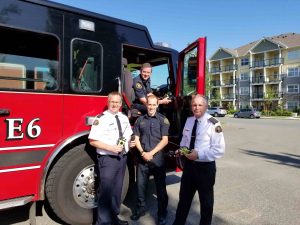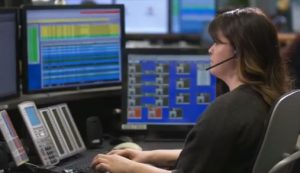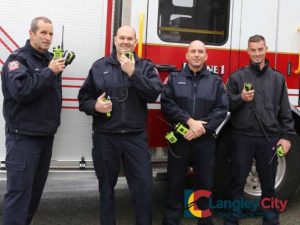We have published the spring 2018 edition of e-communiqué, our quarterly stakeholder newsletter.
The first quarter of the year saw the completion of all agency transitions to the new E-Comm radio system. This means first responders in the Lower Mainland are now using new radio technology that enhances safety and clarity of communications.
Also in the newsletter:
- Find out how we’re retiring the old radio system, first implemented in 1999.
- An update from E-Comm President and CEO Oliver Grüter-Andrew
- A story about Port Coquitlam Fire and Emergency Services joining the E-Comm Wide-Area Radio Network
- An update on construction of the new South Island 9-1-1 Police/Dispatch Centre
Visit our publications page for details.
Township of Langley News Release: Loud, clear, connected, and better equipped to keep themselves and the public safe. That’s how Langley Township firefighters will be working, now that they have joined the E-Comm Wide-Area Radio Network.
On May 23, the Township of Langley Fire Department became a member of the Network, which provides top-of-the-line equipment to first responders and allows firefighters, police officers, and paramedics to all communicate on the same channels. Read the rest of the news release on the Township of Langley website. Contact Township of Langley Assistant Fire Chief Monty Armstrong or 604-532-7515.

L-R: Assistant Chief Monty Armstrong, firefighter Jordan Steeple and Chief Stephen Gamble. Top: Captain Jason Pont.
E-Comm participated in a new video by the Vancouver Police Department. It has important information for the public facing an “active deadly threat” situation. An active deadly threat is when an individual is actively killing or attempting to kill people, generally in a confined and/or populated area, and, in most cases, with a firearm.
These incidents are rare in Canada, but like any serious crime, your survival could depend on being prepared.

Key information: Run or escape
- If there is a safe way out, stop what you are doing and run!
- Leave your belongings behind
- Help others to escape, but don’t let indecision slow you down
- Call 9-1-1 when you are safe
- Prevent others from entering the area
View the video and find out more.
City of Langley News Release
Langley City, British Columbia – Langley City Fire Rescue and Bylaw Enforcement have completed the transition to the new E-Comm 700 Mhz wide area radio network.
“The E-Comm radio network provides first responders with significant safety improvements through increased area coverage and audio quality,” said Fire Chief, Rory Thompson. “Prior to the changeover, City fire and bylaw staff used a single repeater on top of Cascades Casino. There were areas in the City where first responders had limited radio coverage. Often, crews had to exit a building in order to reach our dispatch. The new radio system has solid coverage across the whole city. Apartment block parkades and elevator shafts no longer limit our radio coverage.”
The E-Comm operates the largest multi-agency public safety radio network in British Columbia. The radio system consists of seismically reinforced radio sites across Greater Vancouver and has portable trailers for emergency use. The system serves 19 municipalities in Greater Vancouver including the RCMP and BC Ambulance Service.
Mayor Ted Schaffer is excited about the new radio system. “For the first time, police, fire and ambulance responders can talk to each other about the same incident. This will enhance the City’s ability to cohesively respond to any emergency including a large scale disaster.”
For more information on Langley City’s transition to the E-Comm wide area radio system, contact Fire Chief Rory Thompson at 604.514.2880.
Media Inquiries:
Samantha Paulson
Communications Officer
Langley City
604.514.2823
[email protected]





